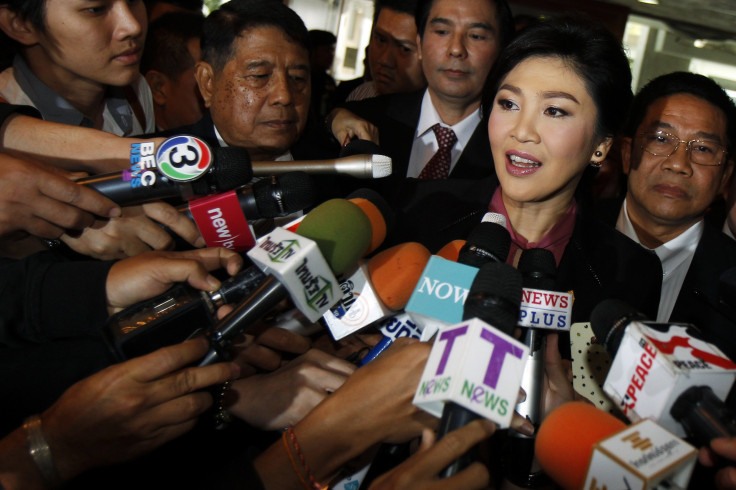Ousted Thai PM A No-Show At Second Round Of Impeachment Hearings

(Reuters) - Former Thai Prime Minister Yingluck Shinawatra failed to appear at her second impeachment hearing on Friday, sending ministers involved in a controversial rice subsidy program to answer questions from parliamentarians critical of her absence.
Thailand's National Legislative Assembly (NLA) will hold a third and final hearing next week and then vote on Jan. 23 whether it finds Yingluck guilty of dereliction of duty. A guilty verdict that could see her banned from political office for five years.
Yingluck, Thailand's first female prime minister, was removed from office for abuse of power in May, days before the army seized power in a coup saying it needed to restore order after months of unrest.
The hearings against Yingluck concern her role in a costly rice-subsidy scheme that aimed to boost the incomes of poor farmers and contributed to her landslide win in a 2011 election.
The scheme paid farmers well above market rates for their crops and caused losses of more than $15 billion to the state, according to the latest Finance Ministry estimate.
Yingluck appeared in parliament last week and, in an impassioned opening statement, defended the scheme. She said proceedings against her were futile as she no longer had a position left to be removed from.
On Friday, NLA members questioned why she could not attend the second impeachment hearing.
"Can I have the reason? Is she ill? Why didn't she come?" said Somchai Sawaengkarn, an NLA member.
Phichit Chuenba, a legal adviser to Yingluck, said she had already "answered every question" during the first hearing.
"She already explained and answered every question last week so she has sent ministers who were involved in the (rice) scheme to answer today instead."
The NLA will hold a third hearing on Jan. 22 before voting on the charges against Yingluck on Jan. 23. A decision to ban her from office would require three-fifths of the vote.
A guilty verdict could upset the delicate calm that has prevailed in Thailand since the coup.
The impeachment is the latest chapter in 10 years of turbulent politics that has pitted Yingluck and her brother, ousted former premier Thaksin Shinawatra, against the royalist-military establishment which sees Thaksin, a populist former telecommunications tycoon, as a threat.
"If Yingluck is impeached this could easily spark snowballing sympathy for Yingluck and a resurrection of pro-Thaksin and pro-democracy sentiment that could give way to the potential beginning of demonstrations," Paul Chambers, director of research at the Institute of South East Asian Affairs affiliated with Chiang Mai University, told Reuters.
"Military repression of these demonstrations could increase sympathy for them, and the longer the military remains in power, the less likely it can sustain societal approval for doing so."
All protests are banned under martial law.
© Copyright IBTimes 2024. All rights reserved.




















